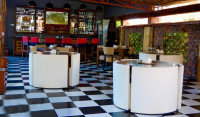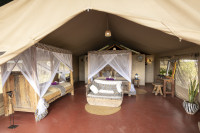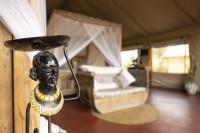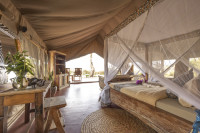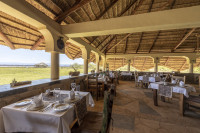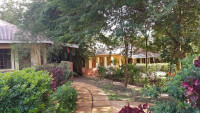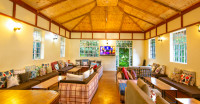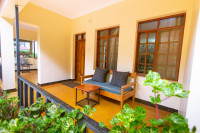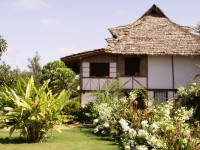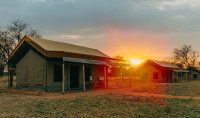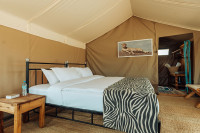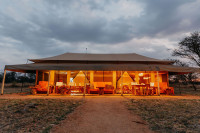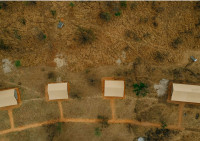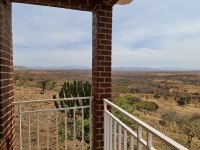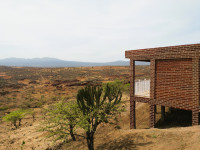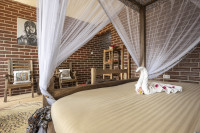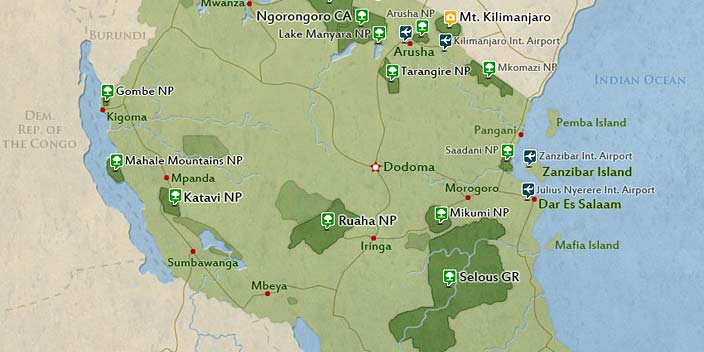
$2,365 pp (USD)
2 travelers on Start dateArrival
Arrival

Day 1
Materuni Waterfalls and Coffee Tour
Materuni Waterfalls and Coffee Tour
Materuni Waterfalls views are truly breathtaking, and with some luck, you will see the summit of Kilimanjaro. When you reach the waterfalls, you will see that they are more than 80 meters high. The pool at the bottom of the waterfall is an inviting place for a refreshing swim so don‘t forget your swimwear! After having enjoyed the scenery, you slowly return with your guide to Materuni village, where you will experience a traditional Chagga lunch. You also will have the opportunity to taste our local banana beer — not to be missed! But that’s not all. Next, the coffee experience awaits you. Here, you will learn how coffee is cultivated, dried, roasted, and further processed. You will also be invited to help with the grinding of the coffee, which is traditionally accompanied by Chagga songs and dances —a fun way to immerse yourself in the local culture. Before you say goodbye, you can savor the coffee you made and appreciate the views of the surrounding rainforest.
- Main Destination:
- Materuni Waterfalls (Highlight)
- Accommodation:
- Tulia Boutique Hotel & Spa
- Meals & Drinks:

Day 2
Tarangire National Park
Tarangire National Park
Giant baobab trees, bush savannah and the seasonal marshes add to the wonder of this nature reserve. The park is considered one of the best places to view elephants up close. The park is also home to buffaloes, zebras, and wildebeests which are always closely followed by a range of predators such as lions. Leopards are seen now and then but cheetahs are rarely spotted. From the open roof of the safari vehicle, you will be able to absorb the landscape and watch the animals. In the late afternoon, you will head to the lodge for dinner and an overnight stay.
- Main Destination:
- Tarangire National Park
- Accommodation:
- Africa Safari Lake Manyara (Safari Comfort)
- Meals & Drinks:

Day 3
Lake Eyasi (Hadzabe Bushmen, Datoga Community)
Lake Eyasi (Hadzabe Bushmen, Datoga Community)
The Hadzabe bushmen are the last true hunter-gatherers in East Africa, around the lake live about 700-800 community men in small groups. The Hadzabe live almost the same way as our ancestors in the Stone Age. They hunt animals with bow and arrow and collect fruits, roots, and honey from the baobab trees. After a welcome and an insight into the village life, it goes with some men on common hunting. The hunt takes place at a fairly fast pace, especially when an animal is spotted. The Hadzabe hunt antelopes and gazelles, but also smaller animals such as birds or mongooses. In the late morning, you will visit the Datoga group. These pastoralists are also skilled blacksmiths. They collect metal scrap, which they cleverly process into bracelets, arrowheads, and knives. You also have the opportunity to visit one of the huts in the village. Here you can watch the women grind flour from corn, from which later bread is baked. In the late afternoon, you will return to the lodge.
- Main Destination:
- Lake Eyasi
- Accommodation:
- Eileen's Trees Inn
- Meals & Drinks:

Day 4
Serengeti National Park
Serengeti National Park
After an early breakfast, you'll head towards the Serengeti. On adventurous slopes, it goes up the Rift Valley into the wide plains of the Serengeti. It is the heart of a vast ecosystem, whose species-rich animal world is unique in the world. Annually, the great migration involves over 1.4 million gnus, almost 300,000 Thomson's gazelles, about 200,000 zebras, and several thousand topi's during the rainy seasons to the areas with the greener and lush meadows. With about 3 million larger mammals, the Serengeti is the national park with the richest wildlife worldwide. Around two-thirds make up the above-mentioned animal species, furthermore, the park is the home to many other animal species, such as giraffe, buffalo, hyena, elephant, and crocodile. Particularly large is the population of feline predators, about 3000 lions, a good 300 cheetahs, and an estimated 400-700 leopards have their hunting ground here.
- Main Destination:
- Serengeti National Park
- Accommodation:
- Kontiki Serengeti Camp
- Meals & Drinks:

Day 5
Serengeti National Park
Serengeti National Park
The entire day is dedicated to wildlife viewing in the Serengeti. The areas that you visit will depend upon where the migrating herds are. Predators usually follow closely behind the trekking animals and include lions, leopards (in the acacia trees), and cheetahs. During the short rainy season in November and December, the herds move from the hills in the north to the plains in the south. During the longer rainy season from April to June, they return up north. As the migration is completely dependent on the yearly rainfalls, the location of the herds may vary from year to year but your guide will know where to locate the animals and where to see them best.
- Main Destination:
- Serengeti National Park
- Accommodation:
- Kontiki Serengeti Camp
- Meals & Drinks:

Day 6
Ngorongoro Crater
Ngorongoro Crater
Rise and shine! After breakfast at daybreak, you will travel back to the Ngorongoro Conservation Area before you drive down into the crater. The massive collapsed volcano is home to over 25,000 mammals ranging from the Big Five—lion, elephant, buffalo, rhino, and leopard—to spotted hyenas, rare wild dogs, and some of the more than 500 bird species of the area. After, an extensive game drive and a picnic lunch, you will leave the caldera in the afternoon and drive to the lodge for dinner and your overnight stay.
- Main Destination:
- Ngorongoro Crater
- Accommodation:
- Africa Safari Karatu (Safari Comfort Bungalow)
- Meals & Drinks:

Day 7
Lake Manyara National Park
Lake Manyara National Park
The park is dominated by the lake of the same name, which attracts large colonies of water birds. Particularly impressive are the pink-colored flamingos, but also many other bird species such as cormorants, pelicans, or storks can be observed here. A total of about 400 different bird species live in the park. The park is also famous for its tree-climbing lions, which are usually found in the central and open part of the park. During the safari, you will also see elephants, zebras, giraffes, buffaloes, hippos, and many other animal species. In the afternoon, you will leave the national park and head to the Arusha/JRO.
- Main Destination:
- Lake Manyara National Park
- Accommodation:
- No accommodation (End of tour)
- Meals & Drinks:



